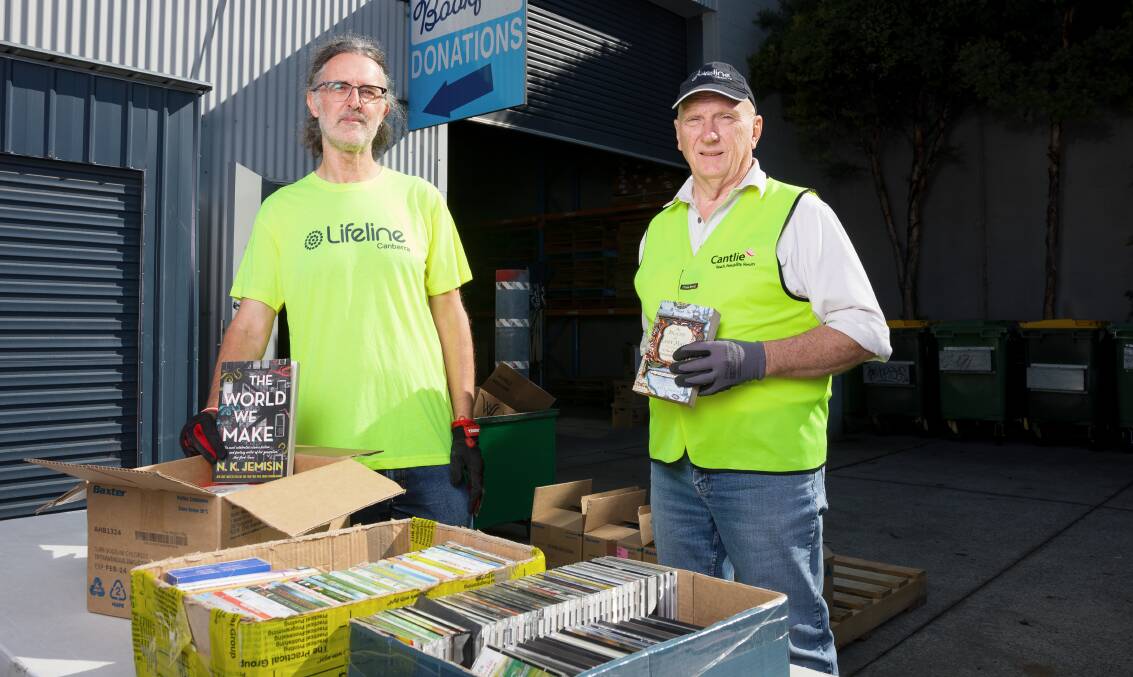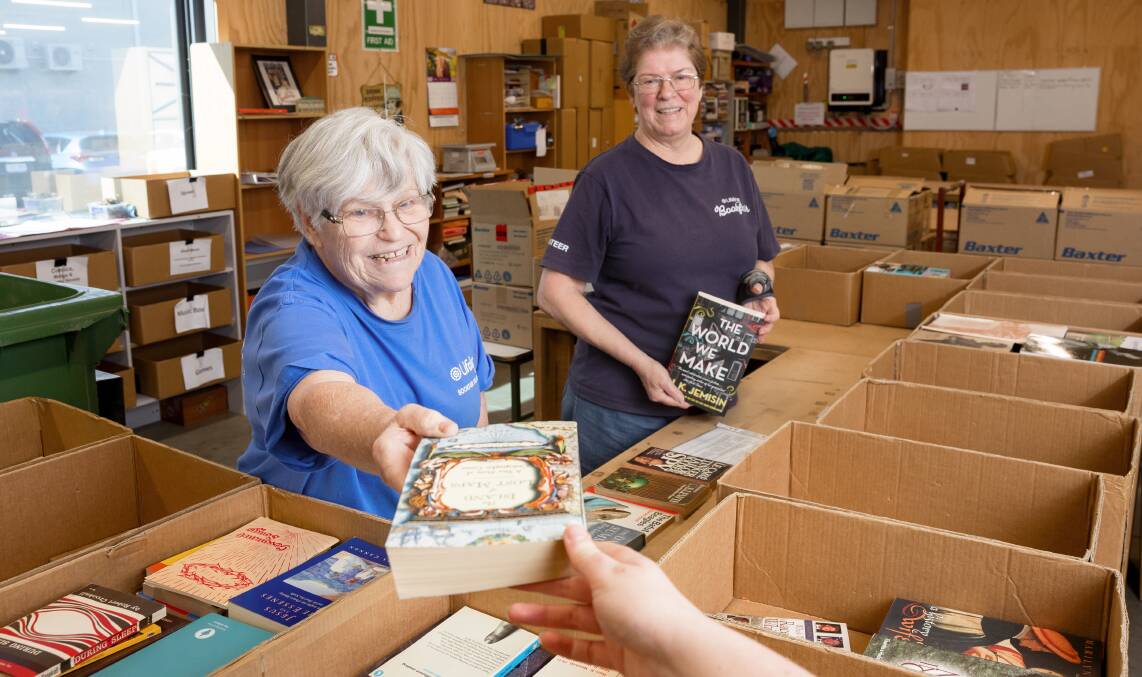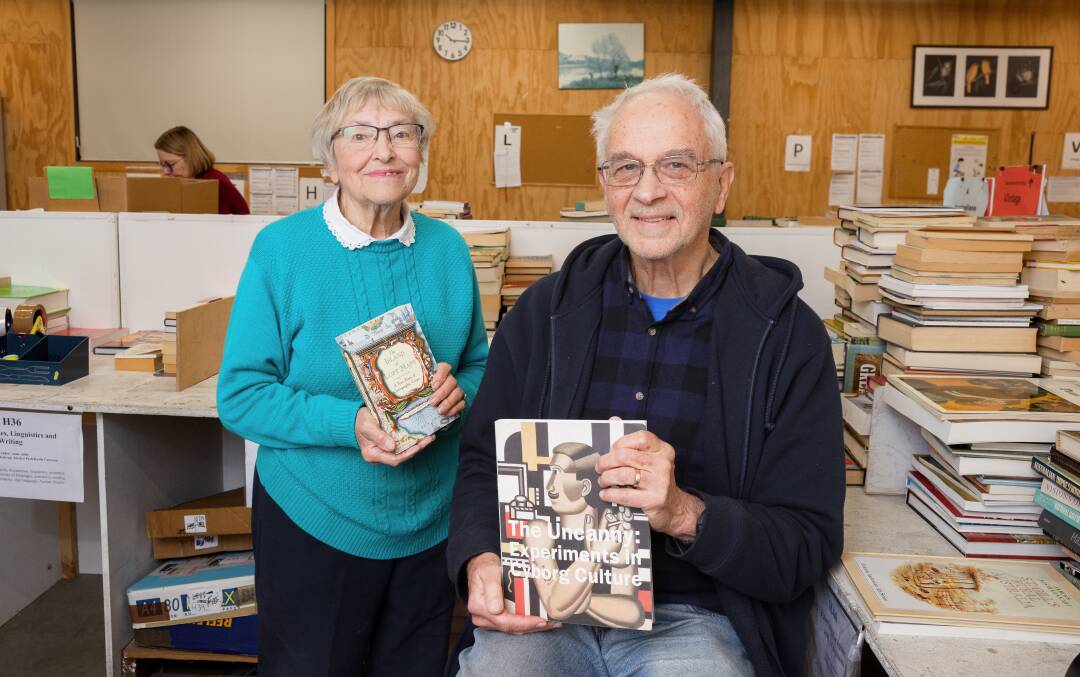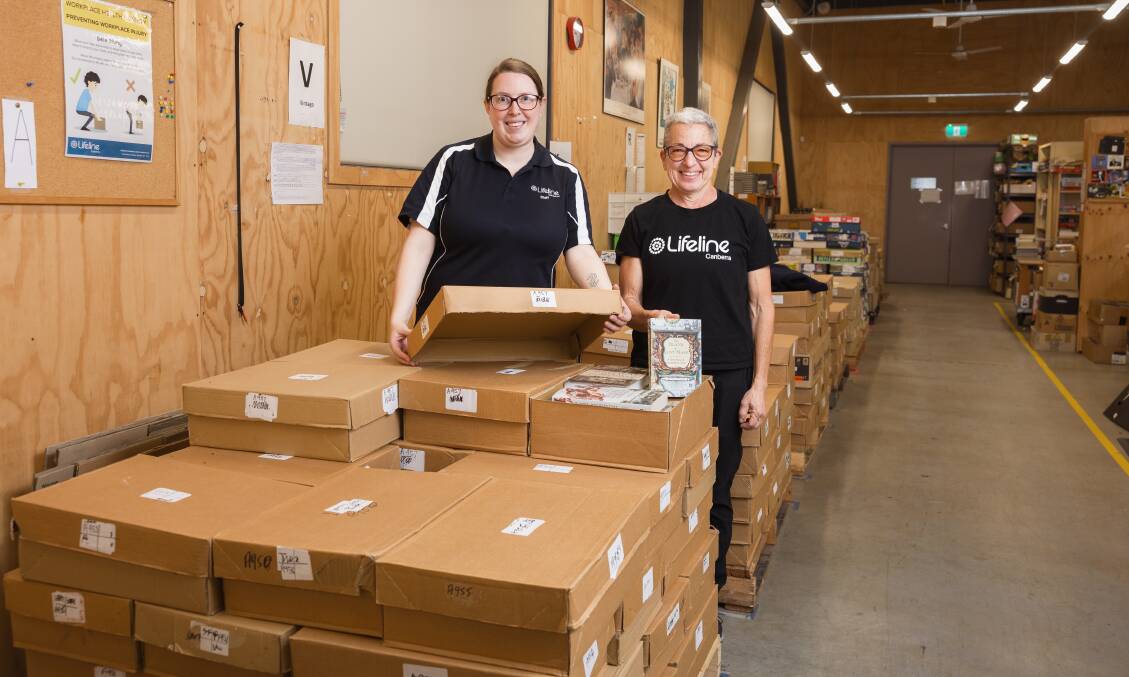
Remember when the Kindle came in and the death of the book was predicted?
Now, Kindles are among the hundreds of thousands of items donated to the Lifeline Bookfair.
And compact discs and DVDs and Blu-rays still sell, even in the age of downloading and streaming.
The next bookfair will be on at Exhibition Park in Canberra from September 8 to 10, 2023.
The Lifeline Bookfair has become an institution for Canberra bibliophiles who for nearly half a century have enjoy browsing through the hundreds of thousands of books, CDs, DVDs, games, puzzles, magazines and more.
It's a major source of funding for the charity, contributing 40 per cent of the funds that enable it to maintain its services, including its 24-hour telephone crisis support line.
But when books are donated to Lifeline, exactly what happens to them? And who are some of the unsung people - mostly volunteers - who deal with them?
We decided to track the projected journey of a book - in fact, two books, one fiction (the science fiction novel The World We Make by N. K. Jemisi), one non-fiction (The Island of Lost Maps: A True Story of Cartographic Crime by Miles Harvey). Obviously there are many items other than books, but it is called the Lifeline Bookfair.
First, the donation
First, a book is either picked up by a volunteer from a donor's home and taken to the collection point in Mitchell, the Book Lovers Lane store at the Fyshwick Markets or to the bookfair itself.
Donation sizes vary widely. Sometimes people are downsizing, sometimes they're disposing of deceased estates, sometimes children have aged out of the books and games and DVDs they once enjoyed. And sometimes people just have a few books they've finished. If donors are coming to the bookfair they can drive into EPIC to the Fitzroy Building and donations will be taken from their car.

Phil Armour, a warehouse volunteer working in logistics, said, "Anything really damaged we'll get rid of," though he was quick to add, "Most of it is really good."
Other items not wanted are Reader's Digest Condensed Books and the obsolete (and presumably not due for a comeback) formats of VHS and cassette tapes.
Most items aren't in such bad condition, however, and books are packed in boxes - up to a weight of 10 kilograms - then 56 boxes are put on each pallet and about 180 pallets are taken to the bookfair, logistics coordinator Lisa Padzensky said.
In the age of the internet, genealogy has largely shifted online. For similar reasons, encyclopedias are not as popular as they once were, except for antique volumes. Real estate agents sometimes buy sets of books to furnish homes on display.
Some titles keep popping up, especially recent books, in large quantities. While this indicates popularity it might also mean those who wanted to read it have already done so. Prince Harry's Spare has been turning up a lot recently.
Books are sorted
Then comes primary sorting. Julie McNamara, who works in this section, said this was where the donations were sorted into categories - fiction and non-fiction books, CDs, DVDs, and so forth. The Jemisi book would go into fiction; the Harvey into non-fiction.
After this, items go to secondary sorting, into more specific categories and subcategories - the Jemisi book would go to science fiction but the Harvey book, while in the broad category of humanities, could go into geography or history. Decisions, decisions. History has a "general" section but is also subdivided into countries and periods, all of which are factored in when deciding.
Eash said, "A lot of our volunteers are ex-teachers and librarians or have expertise in a particular subject."
Dorothy Dockett was a geology lecturer and specialises in science books, for example.
And some volunteers have been at it a long time: Janice Redpath first worked at a Lifeline bookfair in 1977.
"I've been doing it ever since," she said.
Tim Hardy, a retired associate professor of education at the University of Canberra, has worked in the art section for the last decade.
"It's the biggest section in humanities," he said, "130 boxes at each book fair."
The section encompasses art history, design and decorative art, photography, and film, to name some of the subsections.

Books are priced
After being categorised, books are priced then put into smaller boxes for sale at the bookfair.
Warehouse manager Laura Eash said there were a number of considerations, like: "How old is the book, the condition of the book, how popular it currently is?
"We're trying to find a balance between raising money for Lifeline and making sure people who come to Lifeline are getting a good deal."
Volunteers also conduct online research to work out what a fair price would be.
Some particularly unusual or rare or antique items that could fetch more go to the specialist Kakadu Room or the eBay site.
Unbought books
After the Sunday clearout - a set price for a bagful - there are still some leftovers, though Aish said more than 90 per cent of items were sold.
The idea is to have completely new stock for each bookfair so some will go to the Fyshwick shop or the eBay store, others to street libraries or senior citizens' centres.
Many children's books - six pallets every few months - are sent to schools in Papua New Guinea.
As a last resort, some are recycled.
Some items, such as Lego, crime fiction and box-set DVDs, are consistently popular, year after year.
Lego is cleaned and sorted before being put out for sale and is always in demand.
"We'd love more," Eash said.
Others are more variable - classical music CDs might be popular at one bookfair and far less so at another. Interestingly, old computer books sell well to people interested in the history of the devices but old books about child raising and self-help are not popular, being of historical interest rather than practical application.

"Religion has changed," Aish said - as a category, that is. A lot of New Age and spirituality books sell alongside Bibles, though textual commentaries are less popular than they once were.
What sales support
The chief executive officer of Lifeline Canberra, Carrie Leeson, said there had been a 10 per cent increase in call demand in the ACT in the past 12 months. More than 10,000 Canberrans have called 13 11 14 this year January July. July alone saw a 10 per cent increase on the same month last year. About 60 per cent of the callers are female.
"The reasons for people calling have not changed," Leeson said.
Relationship breakdowns are the number one reason for calling. Others in no order include gambling, substance abuse, financial distress, isolation, loss and mental health and crisis calls.
The volunteers who answer listen and when necessary refer callers to other appropriate services.
Eighty students began crisis support training this year, which will add to the 800 active voluntee though some calls still go unanswered because of lack of resources.
From January to July, 2023, 10,367 Canberrans called the Lifeline crisis support line. July alone saw a 10 per cent increase in calls compared with he same month last year. Lifeline Canberra Crisis Supporters have answered 18,950 calls this year but because of demand, others went unanswered. This year, 80 students started crisis supporter training this year which will add to the 300 active crisis supporters. Consistently there are more than 3000 callers nationally to 13 11 14 every day.
Leeson said Lifeline Canberra received no federal government funding and $200,000 a year from the ACT government - "lower than any charity our size".
The Bookfair is a major source of income, providing about 40 per cent of funds along with the store at the Fyshwick Markets
-
Lifeline Canberra's September 2023 Bookfair is on at Exhibition Park in Canberra on Friday, September 8 (9am to 6pm), Saturday September 9 (9am to 5pm) and Sunday September 10 (9am to 4pm). See: lifelinecanberra.org.au. If you need crisis support call 13 11 44.
We've made it a whole lot easier for you to have your say. Our new comment platform requires only one log-in to access articles and to join the discussion on The Canberra Times website. Find out how to register so you can enjoy civil, friendly and engaging discussions. See our moderation policy here.







